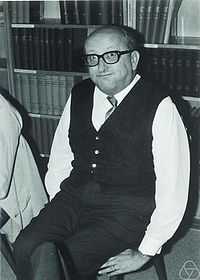Georges Reeb
| Georges Reeb | |
|---|---|
 | |
| Born |
12 November 1920 Saverne, Bas-Rhin |
| Died |
6 November 1993 (aged 72) Strasbourg |
| Nationality | French |
| Fields | Mathematics |
| Institutions | University of Strasbourg |
| Alma mater | University of Strasbourg |
| Doctoral advisor | Charles Ehresmann |
| Doctoral students |
Edmond Fedida Claude Godbillon Gilbert Hector Robert Lutz Jean Martinet |
Georges Henri Reeb (12 November 1920 – 6 November 1993) was a French mathematician. He worked in differential topology, differential geometry, differential equations, topological dynamical systems theory and non-standard analysis.
In 1943 he received his PhD from University of Strasbourg (that had been evacuated during the war to Clermont-Ferrand) with the dissertation Propriétés topologiques des variétés feuilletées. His adviser was Charles Ehresmann.
In 1954, he was at the Institute for Advanced Study.
In 1965 Reeb, Jean Leray and Pierre Lelong founded a series of encounters between theoretical physicists and mathematicians in Strasbourg (Rencontres entre Mathématiciens et Physiciens Théoriciens).
He was a professor in Grenoble (Université Joseph Fourier) and Strasbourg (Université Louis Pasteur) where he directed the Institut de Recherche Mathématique Avancée (The Institute of Mathematics of the University of Strasbourg) between 1967 and 1972,[1] which he founded with Jean Frenkel in 1966.
Reeb is the founder of the topological theory of foliations (Feuilletées, Blätterungen), manifolds with a special local product structure.
He invented what is now called the Reeb foliation, a foliation of the 3-sphere, all the leaves of which are diffeomorphic to R2, except one, which is a (compact!) 2-torus.[2]
Reeb sphere theorem says that a compact manifold with a function with exactly two critical points is homeomorphic to the sphere. This is used to prove that the Milnor spheres, although not diffeomorphic, are homeomorphic to the sphere S7, a result that came in 1956.
Reeb received an honorary doctorate from the Albert-Ludwigs-Universität Freiburg.
See also
- Reeb graph
- Reeb vector field
- Contact geometry
- Séminaire Nicolas Bourbaki
- Séminaire Nicolas Bourbaki (1950–1959)
- Reeb sphere theorem
- Reeb foliation
- Reeb stability theorem
References
- ↑ http://www-irma.u-strasbg.fr/article217.html?lang=en
- ↑ Differential Geometry, Strasbourg, 1953 from Notices of the AMS, March 2008
External links
- RAMIFIED RECURSION AND INTUITIONISM in memory of Georges Reeb
- Georges Reeb at the Mathematics Genealogy Project
|